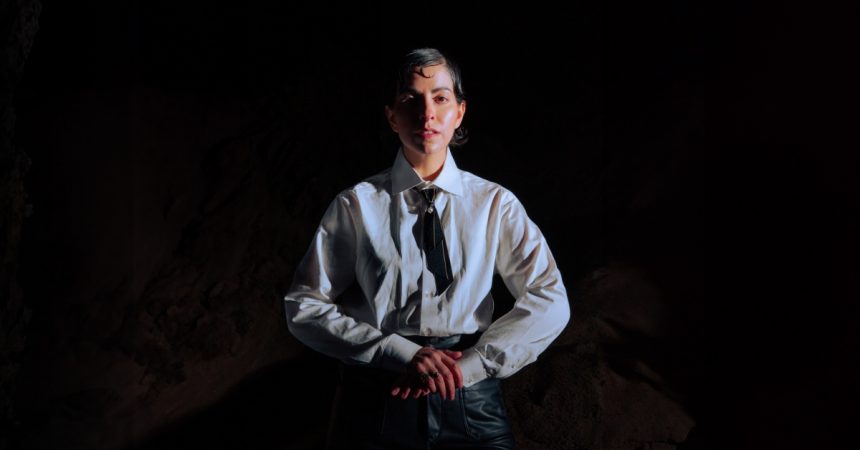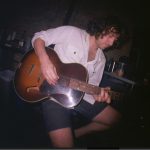Becca Mancari’s Left Hand is by far the boldest and most thoughtful project we’ve seen from the Nashville-based musician thus far. Pushing the limits of avant-pop, Mancari has made an album that has championed where many others have fallen short — finding a balance between the surreal to the painfully real, in sound, structure, and lyricism. They swing from romance, levity, hope, and confidence to the traumas of abandonment, rejection, and heartbreak — unraveling the very tangible truths of living as a queer person in the South.
While Mancari’s previous work has reflected similarly prolific, personal narratives, built on a foundation of floaty guitar riffs and plush bedroom-pop hooks, Left Hand leaves no stone unturned. Mancari is diving as deep as we’ve ever seen into the emotional, gut-wrenching ether, and allowing the dark waters of their past, however harrowing, to be a healing force. Through mental health struggles and the journey toward sobriety, as well as family’s rejection of their gender and sexual identification, Mancari weaves it all together while offering hope on the other side of it all. On “Over and Over,” Mancari’s deep and delicate vocals ripple across soft, poppy synths, singing, “There is something to the feeling/Head hanging out of the window/Being OK that we don’t know,” reminding us that, “We can have it like we used to, over and over and over and over again.”
Read more: How boygenius are breaking big
With a host of close friends from Nashville, featuring Brittany Howard, who they play with in Bermuda Triangle, boygenius’ Julien Baker, and Paramore’s Zac Farro, Mancari has garnered a tightly knit group that functions as both chosen family and creative collaborators, who helped on the album — a flesh-and-blood example of the hard work Mancari has fought to find silver linings amid more painful moments. Clothing these vital messages of hope and beautiful collaborations, Left Hand is an offering of incredible musicianship.
Showcasing more dexterity and depth in musicianship from Mancari, whose previous albums leaned harder into classic indie-pop elements, we find a thoughtfully widened scope of sounds across the tracklist. Backed by soft rock and chillwave, with an amalgamation of distortions that emerge from the shadows of a song, Mancari’s vocals slide into a deep growl before a swifty, sprightly tempo rise. Unexpected isn’t the right word, as the album feels so inherently true and authentic to Mancari. Rather, it’s a new side of them that’s been uncovered for the listener to enjoy, to feel, to be challenged and comforted by — and it shines with a brilliance that is impossible to overlook. We spoke with the light that is Becca Mancari about Left Hand, creative catharsis, and finding queer community in the South.
I can only imagine the making of this album was a cathartic experience. What would you say the strongest emotions you felt about it were throughout, and how are you feeling about it now, during and after the release?
I think my guiding light during the making of the record was that I had to trust myself completely. Even if it was scary, I had to go deeper and to pull back the curtains and show all sides of myself, even if it’s uncomfortable at times.
Left Hand’s tracklist is “meant to be played in moments when the listener needs reassurance.” Was that the goal for you, to provide that encouragement? Did the making of these songs provide that for you?
I did want to provide a place where you could truly face yourself and though that can feel pretty intense and a little scary at times; if you can learn how to love and accept yourself, it can actually free you. I wanted this record to feel like you were embracing yourself fully for the first and that you are safe to get back into your body.
There’s a beautiful balance between heavy sentiments and pop sounds on this record, which I guess is that “reassurance” — especially with “Over And Over.” Was this song inspired by a specific moment for you?
Yes, this song has a very specific story about when I first moved to Nashville, and I was actually back “in the closet” for a little while. It was really hard for me to lose my family and the whole community I grew up in when I came out as queer. So, when I moved to Nashville, I really did find my way out for the first time. I also really wanted to capture the feeling of when you are so young that you feel invincible, and you truly feel like you might live forever.
You are definitely someone who I consider to have a strong creative community around you. What was it like building that? How did that come to fruition on this album, and what was it like working with your friends? That can sometimes be a tricky situation to navigate.
It’s crazy that these friendships all were based on the fact that we all really just like each other and have a good time hanging out! I think it’s amazing that, honestly, the least interesting thing about all of us is our music. The most wonderful thing about each person that played on the record is that they are kind, thoughtful, interesting, funny, and oh yes a damn good musician. Keeping friendship as the most sacred thing is what we all do for each other.
How has Nashville helped, or hurt, you? What has your experience been with the queer community there? When I’ve talked to H and Brian about Fruits, they always mentioned their goal being to create a safe space they didn’t necessarily have in that city, or especially that state.
When I first moved to Nashville, it was not “cool” to be an openly queer artist yet, and it was actually a really big deal that I was talking about queer issues and my own involvement in the community. I was not able to get a label here, though, and actually, I am the first artist to ever be signed “from Nashville” at my Brooklyn-based label Captured Tracks, but the thing that I love about living in a place like Nashville is that the community is so loving to each other because we know what it’s like to be different!
Who did you idolize growing up? Who was your North Star, as an artist? Who was your first crush?
Tegan and Sara were my one and only, and I loved everything they did. And now all these years later, we are actually friends, and hint hint might be doing something together soon!

Let’s talk about the album title. It’s a very personal one to you.
Yes, I got the name from seeing my family’s crest in Calabria, Italy, and our name actually means “Left Hand.” I connected with the fact that in some cultures left-handed children were told that it was not “normal” or “natural,” and they were forced to use their right hand. I think similarly to the queer community, we have been told that we are not “normal” and we need to “change,” and I really was drawn to this idea of fighting back for our lives and saying we are perfect exactly how we are born.
What is your favorite song on the album and why?
Oh boy, this one is always hard for me, but I really love the title track “Left Hand” because it was actually done in one take. The vocals are from the demo session where it was just a stream of thought coming out of me. You can hear me start to cry in the song, and I just like that it’s not filtered… oh, and when the drums come in, it’s a tremendous feeling to me.
This definitely feels and sounds like a departure from your previous album. What do you think led you to that creative, and it seems, personal growth? Has it always been easy for you to express your authentic emotions through your work, or did that come with time or a specific experience?
I had never been to therapy ever in my life, and when I put out my last record The Greatest Part, I still was processing so much trauma from coming out. I was at my breaking point as a person. I started going to therapy during 2021, and it really changed my life. I was able to really sit with myself and allow myself to write songs that were the most vulnerable parts of me on display. It was painful but necessary for me to really look in the mirror and see what was going on. I don’t think I could ever write a record like this again. It was such an important moment, and I needed to do it.
What is the next goal set for Becca Mancari?
I think the next record is already starting to get going in my brain, but be warned: I don’t make the same kinds of records twice. Who knows? Maybe the next will be a punk record.









